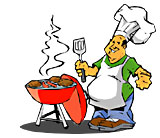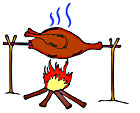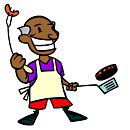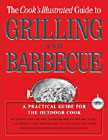|
|
 The Barbecue: Summer Delight With A Sizzling Past The Barbecue: Summer Delight With A Sizzling Past
by Marjorie Dorfman
All of us have our own private ideas about the true meaning behind holiday family reunions and resentments, all of which smolder relentlessly with whatever is cooking on the outdoor grill. Does anyone, however, know where the word and the idea of a barbecue actually came from? Read on for some sizzling thoughts on a very pleasant-tasting subject.
|
| The delicious delight of backyard barbecue kabobs. |
|
|
Barbecues conjure images of outdoor family moments that capture families at their sort of best. Memorial Day signals a return to the beaches and the family fold (where sharks and fins of all sizes and shapes congregate in search of ammunition). The origins of both the word and the activity are existentially obscure, although most etymologists believe that barbecue derives from the word barbicu in the language of the Caribbean Taino people (No, they don’t make leather goods. That’s someone else.) The translation is sacred fire pit and is also spelled barbicoa or barabicoa. The word describes a grill for cooking meat consisting of a wooden platform resting on sticks.
 According to the Oxford English Dictionary, the word was introduced to the English language by British buccaneer, William Dampier. Food historians are certain that both the word and cooking technique traveled from the Caribbean into Spanish, then French and English. In following the tradition of the activity, barbacoa involves digging a hole in the ground and placing some meat (usually a whole goat, as nasty neighbors and relatives are too smart to be taken off guard) with a pot underneath it so that the running juices render a hearty broth. The meat is then covered with maguey leaves and coal and set alight. It takes a few hours to cook properly. According to the Oxford English Dictionary, the word was introduced to the English language by British buccaneer, William Dampier. Food historians are certain that both the word and cooking technique traveled from the Caribbean into Spanish, then French and English. In following the tradition of the activity, barbacoa involves digging a hole in the ground and placing some meat (usually a whole goat, as nasty neighbors and relatives are too smart to be taken off guard) with a pot underneath it so that the running juices render a hearty broth. The meat is then covered with maguey leaves and coal and set alight. It takes a few hours to cook properly.
Two inaccurate theories persist concerning the origins of the word, barbecue. One claims that the word is derived from the French language and began when French visitors to the Caribbean saw a pig being cooked whole and described the process as barbe a queue, meaning from beard to tail. While this sounds logical due to the similar sounds of the words, experts claim it is still as false as the best-made dentures. Another theory states that BBQ dates back to the days when roadhouses and beer joints with pool tables advertised Bar, Beer and Cues. Over time, the phrase was shortened to BBCue and then BBQ.
 Initially, the barbecue revolved around the cooking of pork, which was a low maintenance source of food in the 19th century. This was particularly true throughout the Southern United States where the animals were often released to forage for themselves in forest and woodlands. These semi-wild pigs were caught and eaten whenever food or meat supplies ran low. Prior to the American Civil War, Southerners ate approximately five pounds of pork for every one pound of beef they consumed. Every part of the animal was either eaten immediately or saved for later. (This included ears, feet and some of the organs as well.) Pig slaughtering was a time for feasting and celebrations that were sometimes called "pig-pickins." Many food historians believe that the concept of the southern barbecue evolved from these neighborhood gatherings. Initially, the barbecue revolved around the cooking of pork, which was a low maintenance source of food in the 19th century. This was particularly true throughout the Southern United States where the animals were often released to forage for themselves in forest and woodlands. These semi-wild pigs were caught and eaten whenever food or meat supplies ran low. Prior to the American Civil War, Southerners ate approximately five pounds of pork for every one pound of beef they consumed. Every part of the animal was either eaten immediately or saved for later. (This included ears, feet and some of the organs as well.) Pig slaughtering was a time for feasting and celebrations that were sometimes called "pig-pickins." Many food historians believe that the concept of the southern barbecue evolved from these neighborhood gatherings.
Barbecue also refers to a social gathering where food is served, usually outdoors in the early afternoon. These social affairs are also called "cookouts" in the southern USA and barbecue almost always refers to the food (pork BBQ). A grill is the cooking device that is usually employed at these get-togethers.
Each southern region is known for its own particular technique and the differences usually rest in the type of sauce utilized. While the Carolinas tend to specialize in tangier, vinegar-based sauces, Memphis barbecues are renowned for their tomato and vinegar-based sauces. South Carolina obviously couldn’t make a decision because it is the only state known to use all four recognized sauces, which include mustard, vinegar, light and heavy tomato-based sauces. In some Memphis restaurants no sauce at all is used, and the meat is rubbed with dry seasoning (dry rubs) and then smoked over hickory wood. Sauce may be served on the side.
Georgia and Tennessee claim their own particular style. Almost always, pork is served with a sweet tomato-based sauce. The pulled pork sandwich, created by shredding the meat after it is barbecued, is popular in North Carolina and Memphis and is served on a bun topped with coleslaw. In northern Alabama, particularly near Huntsville, barbecue is served with a mayonnaise-based sauce.
Every October in Kansas City, Missouri, a contest known as the American Royal Barbecue is held. Two distinct competitions are held over the course of four days. The first is the Invitational contest, into which competing teams winning other qualifying contests throughout the year gain entry. The Open Contest is the second one, in which any team can compete. This is without a doubt the largest championship barbecue competition in the world and last year alone some 496 teams competed.
 Mention must be made here of the World Championship Barbecue contest, which is held annually in Memphis during the May festival. There are others as well, held in virtually every state during the warmer months of the year, usually commencing in April and going through September. The "Ribfest" of Chicago is probably the best known among these. Newspaper columnist, Mike Royko, first organized it back in 1982, and it attracted over 400 contestants. By 1990, it had more than 10,000 attendees and this contest more than any other helped popularize to a much wider audience the distinctions between different regional styles. Competitions are divided between teams of cooks and then sub-divided into separate contests for beef, pork and poultry and for the best barbecue sauces. Mention must be made here of the World Championship Barbecue contest, which is held annually in Memphis during the May festival. There are others as well, held in virtually every state during the warmer months of the year, usually commencing in April and going through September. The "Ribfest" of Chicago is probably the best known among these. Newspaper columnist, Mike Royko, first organized it back in 1982, and it attracted over 400 contestants. By 1990, it had more than 10,000 attendees and this contest more than any other helped popularize to a much wider audience the distinctions between different regional styles. Competitions are divided between teams of cooks and then sub-divided into separate contests for beef, pork and poultry and for the best barbecue sauces.
If there were one American state more associated with barbecue than any other, Texas would win hands down. Usually barbecue in the Lone Star State involves beef, which shouldn’t come as a surprise to anyone living in the free world. Texas boasts of four regional styles; all with different flavors, methods of preparation, ingredients and cultural origins. Barbecue in the eastern section of the state is an extension of traditional southern traditions spread largely by African-Americans who settled in Houston and Dallas. The methods are similar to those in Tennessee and Arkansas. The protein is usually pork cuts of either shoulder or ribs, which are indirectly slow-smoked over hickory wood and the sauce is sweet, thick and tomato-based.
|
|
|
|
 |
|
|
 "Britain is the only country where the food is more dangerous than the sex." "Britain is the only country where the food is more dangerous than the sex."
Jackie Mason
"I come from a family where gravy is considered a beverage."
Erma Bombeck
|
Don't miss this excellent book:
The Cook's Illustrated Guide To Grilling And Barbecue:
A Practical Guide for the Outdoor Cook
by Cook's Illustrated

This book is a comprehensive nuts and bolts volume that thoroughly examines outdoor cooking starting with the basics. The 12-page introduction to grilling, "Outdoor Cooking 101," walks you step-by-step through the essentials of grilling, grill-roasting, and barbecuing using both charcoal and gas grills. Whether you’re a novice outdoor cook or aspiring grillmaster, this encyclopedic examination of one of America’s favorite pastimes will be your guide to foolproof grilling and barbecuing.
|

Click for a printer friendly version of this article.
|
|